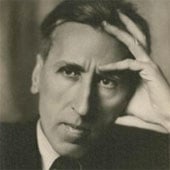
Dmitri Kabalevsky
Russian composer who worked hard to realise the musical potential of Socialist-Realism during the Soviet era * Dmitry Kabalevsky's music for children has been loved and played by young musicians all over the world * Studied at Moscow Conservatoire under Goldenweiser for piano and Myaskovsky for composition * Became a Conservatoire professor in 1932 and a founder-member and official of the Union of Composers in 1938 * Through editorial work on magazine Sovietskaya Muzyka, and links with Soviet educational organisations, had a powerful influence on Soviet music education * Prolific repertoire of music for children to play and sing includes many piano works, and three concertos ‘dedicated to Soviet youth’: Violin Concerto (1948), Cello Concerto No.1 (1949) and Piano Concerto No.3 (1952) * His 24 Piano Preludes, based on Russian folksongs from the Rimsky-Korsakov collection, were frequently played by Vladimir Horowitz * His lively opera Colas Breugnon, set in 17th century France and based on a novel by Romain Rolland, uses French folk idioms in a fresh but traditional way, and a suite from the opera has reached a wide audience * His Requiem (1963) is a secular work to poems by Robert Rozhdestvensky ‘in memory of those who died in the fight against fascism’ and reflects the recent impact of Britten’s War Requiem * Died at an advanced age, not long before final collapse of Soviet regime whose ideals he had served so faithfully
Works by Dmitry Kabalevsky include:
Colas Breugnon: Suite from the opera (1938)
24 Preludes for piano (1924)
3 Piano Concertos (1929, 1936, 1952)
Works by Kabalevsky are represented by Boosey & Hawkes/Sikorski for the United Kingdom, the British Commonwealth (excluding Canada), the Republic of Ireland, Germany, Switzerland, Denmark, Iceland, Norway, Sweden, the Netherlands, Spain, Portugal, Greece, Turkey
and Israel
"You can look for novelty in music, as long as you know what you are looking for and on behalf of whom you are looking for it" — Dmitri Kabalevsky
